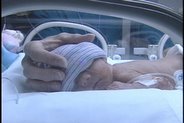MRSA infection is a complex problem that is not to be eradicated with a one shot effort. Simple solutions, those sometimes promoted by press and politicians, are part of the answer, but not the entire answer. Maybe that's because staph bugs don't read the newspaper or listen to political speeches. Otherwise they would know to completely leave the hospital and never return following the 'deep clean'.
The headline in question appeared in the UK's Independent, written by Brian Brady and Jane Merrick:
Thousands of patients will remain at risk from superbugs, despite a £57m "deep clean" of hundreds of hospitals, because a vital screening programme will not be put in place for at least a year.The thought that a one time deep cleaning would end Hospital acquired Infections is naive at best, dangerous at worst. Professor Pennington' s assertion that MRSA infections are not "...environmental..." depends on what your definition of environmental is.
One of the world's leading experts on hospital-acquired infections (HAIs) warned yesterday that every one of the hospitals cleaned under Gordon Brown's flagship health policy will be back to square one as soon as the cleaners finish, because no one is stopping bacteria such as MRSA and Clostridium difficile from coming into the buildings.
Professor Hugh Pennington of Aberdeen University said the deep-clean programme would be "an expensive waste of resources".
"Professor Pennington said: "Politicians get hung up on cleaning, but the major issue isn't environmental; it is people bringing the bugs into hospitals. Once the bacteria hit the floor they die off. The natural home of MRSA is either in infected patients or up the noses of the rest of us, so that is what they should be attacking."At VIGILAIR we stress that all infections are environmental. A good example of MRSA as an environmental pathogen
is found in an article published in the journal of the Hospital infection Society-- 'Ventilation grilles as a potential source of methicillin-resistant Staphylococcus aureus causing an outbreak in an orthopaedic ward at a district general hospital', (1998) 39: I 27-I 33).
This article showed how MRSA was being distributed in a hospital via the ventilation system. While it is true that most MRSA is introduced into the hospital by visitors, patients and staff, environmental controls are key in removing these pathogens from the environment. Pennington's statement that MRSA bacteria die when they hit the floor is contradicted by a large body of research. The November 2006 issue of Infection Control and Hospital Epidemiology contains a report on MRSA survival that is typical of this research:
"We examined the duration of survival of 2 strains of methicillin-resistant Staphylococcus aureus (MRSA) on 3 types of hospital fomites. MRSA survived for 11 days on a plastic patient chart, more than 12 days on a laminated tabletop, and 9 days on a cloth curtain."Ignoring the care environment in the fight against MRSA is short sighted. The strategy that we recommend acknowledges that the environment plays a significant role in hospital acquired infection and that several tactics must be employed together to be successful.
We've been able to culture Staph from the cooling coils of hospital HVAC units. Psuedomonas, Staph and many other bacteria are taken from patient care areas, and then find an excellent breeding ground in the dark, cool and food rich home in hospital ventilation systems.
VIGILAIR technology removes the HVAC as a reservoir for pathogens by disinfecting the HVAC system. VIGILAIR UVGI deactivates bacteria, fungi and viruses on surfaces as well as in the air. Importantly, this protection is constant. Unlike one time cleanings the germicidal irradiation of cooling coils continues 24 hours a day, VIGILAIR technology is no silver bullet, either. It must be used in tandem with hand washing and 'deep cleaning'. The combination of these efforts is the best way to remove these pathogens. Any one of these tactics used in isolation will provide only a temporary relief, because hospital acquired infections are environmental by nature.

